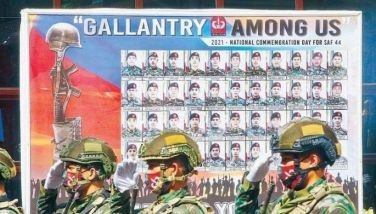Ermita issues anti-terror guidelines
March 26, 2004 | 12:00am
Defense Secretary Eduardo Ermita ordered yesterday the various government intelligence agencies to coordinate their efforts so they can implement a four-point guideline on how to cope with terrorist threats.
"The problem was that our intelligence people have been keeping vital information among themselves instead of sharing these to other units," he said.
Ermita said he will also strengthen the country’s links with anti-terrorist task forces in other countries as part of his guidelines which call for the immediate implementation of the four Ps — prediction, prevention, preparation and performance.
The sharing of information with foreign intelligence agencies will give a "clearer picture of the enemy," he added.
On the other hand, Armed Forces chief Gen. Narciso Abaya said more troops will be trained on anti-terrorist operations starting next month.
Ermita, who is the national anti-terrorist task force coordinator, said Metro Manila is "free of local and foreign terrorists," and that residents have nothing to worry about their security.
"The general situation is that everything is normal, everything is under control," he said. "We have no specific information as to the presence of (terrorists)‚ here in Metro Manila."
However, Ermita warned that foreign terrorists remain in Mindanao, especially in the Lanao provinces, Central and Western Mindanao, and the Autonomous Region in Muslim Mindanao.
"Since we know that we have terrorists in the Philippines, especially in Mindanao, we just want to be sure that the authorities aptly cover the activities, the movement and for that matter, what the plans of these terrorists (are)," he said.
As for terrorist attacks, there is no imminent danger in Metro Manila and other urban centers, he added.
Ermita said it must be expected that terrorists might take advantage of the national and local elections on May 10.
"I think it’s normal to expect that if you are a terrorist, first you want to hit targets that will create casualties more to non-combatants, civilian and even government forces, and then of course create chaos and disorder," he said.
Ermita said the Armed Forces has an anti-terrorist unit known as Task Force Bantay Laya, while the Philippine National Police has Task Force Sanlahi.
"I am satisfied with the presentation and the undertakings being done by all agencies, and for that matter, we are now ready to meet and discuss the matter with the President," he said.
Task Force Sanlahi has been in the forefront of the anti-terrorism campaign, particularly in Central Mindanao, he added.
Ermita presided over a joint anti-terrorism conference at the Department of National Defense in Camp Aguinaldo, Quezon City yesterday.
President Arroyo created the anti-terrorist task force in the aftermath of the March 11 railway bombings in the Spanish capital of Madrid. –Jaime Laude
"The problem was that our intelligence people have been keeping vital information among themselves instead of sharing these to other units," he said.
Ermita said he will also strengthen the country’s links with anti-terrorist task forces in other countries as part of his guidelines which call for the immediate implementation of the four Ps — prediction, prevention, preparation and performance.
The sharing of information with foreign intelligence agencies will give a "clearer picture of the enemy," he added.
On the other hand, Armed Forces chief Gen. Narciso Abaya said more troops will be trained on anti-terrorist operations starting next month.
Ermita, who is the national anti-terrorist task force coordinator, said Metro Manila is "free of local and foreign terrorists," and that residents have nothing to worry about their security.
"The general situation is that everything is normal, everything is under control," he said. "We have no specific information as to the presence of (terrorists)‚ here in Metro Manila."
However, Ermita warned that foreign terrorists remain in Mindanao, especially in the Lanao provinces, Central and Western Mindanao, and the Autonomous Region in Muslim Mindanao.
"Since we know that we have terrorists in the Philippines, especially in Mindanao, we just want to be sure that the authorities aptly cover the activities, the movement and for that matter, what the plans of these terrorists (are)," he said.
As for terrorist attacks, there is no imminent danger in Metro Manila and other urban centers, he added.
Ermita said it must be expected that terrorists might take advantage of the national and local elections on May 10.
"I think it’s normal to expect that if you are a terrorist, first you want to hit targets that will create casualties more to non-combatants, civilian and even government forces, and then of course create chaos and disorder," he said.
Ermita said the Armed Forces has an anti-terrorist unit known as Task Force Bantay Laya, while the Philippine National Police has Task Force Sanlahi.
"I am satisfied with the presentation and the undertakings being done by all agencies, and for that matter, we are now ready to meet and discuss the matter with the President," he said.
Task Force Sanlahi has been in the forefront of the anti-terrorism campaign, particularly in Central Mindanao, he added.
Ermita presided over a joint anti-terrorism conference at the Department of National Defense in Camp Aguinaldo, Quezon City yesterday.
President Arroyo created the anti-terrorist task force in the aftermath of the March 11 railway bombings in the Spanish capital of Madrid. –Jaime Laude
BrandSpace Articles
<
>
- Latest
- Trending
Trending
Latest
Trending
Latest
Recommended






























